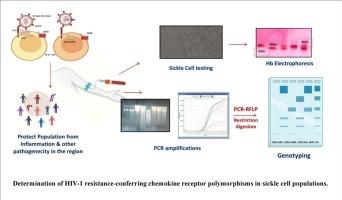The prevalence of chemokine receptors (CCR5-Δ32, CCR5-m303, CCR2-64I, and SDF1-3'A) in the population with sickle cell anemia
IF 0.9
Q4 GENETICS & HEREDITY
引用次数: 0
Abstract
Objective
The objective of the present research was to examine the presence of gene polymorphisms within chemokine receptors in a population with Sickle Cell Disease (SCD) and in a group of individuals without health complications. The selected genotypes were the chemokine receptor genes CCR5-Δ32, CCR5-m303, CCR2-64I, and SDF1-3'A.
Methods
From Chhattisgarh, India, 2586 individuals were screened for sickle cell anemia, out of which 200 individuals with SCD and 50 as controls were subjected to genotyping of CCR5-Δ32, CCR5-m303, CCR2-64I, and SDF1-3'A gene polymorphisms using RT-qPCR, followed by RFLP. The frequencies of both genotypes and alleles were calculated, and the assessment of Hardy-Weinberg equilibrium was performed using the chi-squared goodness-of-fit test.
Results
We report a 10.55 % (HbAs-9.78 % & HbSS-0.77 %) prevalence of sickle cell anemia in Chhattisgarh, India, and the allelic frequencies of CCR5/CCR5 and Δ32/Δ32 as 0.966 and 0.034, respectively (χ2 = 0.3097, P-0.85654). The CCR5-m303 mutation was not detected in any of the individuals, indicating the absence of mutant alleles. The allelic frequencies for the wild-type CCR2-64 V allele and the CCR2-64I variant were calculated at 0.84 and 0.16 (χ2 = 6.9444, P = 0.3105) and the wild-type SDF1 and the 3′A variant were determined as 0.732 and 0.268, respectively (χ2 = 0.9630, P-061783).
Conclusions
The present study provides essential insights into the prevalence of chemokine receptor gene polymorphisms in SCD and healthy populations. The findings indicate distinct patterns in the distribution of genotypes and alleles, consistent with Hardy-Weinberg equilibrium. The variant CCR5-Δ32 is found to be helpful in inhibiting inflammation, especially in the SCD population.

趋化因子受体(CCR5-Δ32, CCR5-m303, CCR2-64I和SDF1-3'A)在镰状细胞性贫血人群中的患病率
目的本研究的目的是检查镰状细胞病(SCD)人群和一组无健康并发症的个体中趋化因子受体基因多态性的存在。选择的基因型为趋化因子受体基因CCR5-Δ32、CCR5-m303、CCR2-64I和SDF1-3'A。方法对来自印度恰蒂斯加尔邦的2586例镰状细胞性贫血患者进行筛查,其中200例SCD患者和50例对照患者采用RT-qPCR对CCR5-Δ32、CCR5-m303、CCR2-64I和SDF1-3'A基因多态性进行分型,并进行RFLP分析。计算两种基因型和等位基因的频率,采用卡方拟合优度检验评估Hardy-Weinberg平衡。结果我们报告了10.55% (hbas - 9.78%);印度恰蒂斯加尔邦镰状细胞性贫血患病率(hbss - 0.77%)、CCR5/CCR5和Δ32/Δ32等位基因频率分别为0.966和0.034 (χ2 = 0.3097, p = 0.85654)。没有在任何个体中检测到CCR5-m303突变,表明没有突变等位基因。野生型ccr2 - 64v和CCR2-64I变异的等位基因频率分别为0.84和0.16 (χ2 = 6.9444, P = 0.3105),野生型SDF1和3'A变异的等位基因频率分别为0.732和0.268 (χ2 = 0.9630, P-061783)。结论本研究对SCD和健康人群中趋化因子受体基因多态性的患病率提供了重要的见解。研究结果表明,基因型和等位基因的分布模式明显不同,符合Hardy-Weinberg平衡。变异CCR5-Δ32被发现有助于抑制炎症,特别是在SCD人群中。
本文章由计算机程序翻译,如有差异,请以英文原文为准。
求助全文
约1分钟内获得全文
求助全文
来源期刊

Gene Reports
Biochemistry, Genetics and Molecular Biology-Genetics
CiteScore
3.30
自引率
7.70%
发文量
246
审稿时长
49 days
期刊介绍:
Gene Reports publishes papers that focus on the regulation, expression, function and evolution of genes in all biological contexts, including all prokaryotic and eukaryotic organisms, as well as viruses. Gene Reports strives to be a very diverse journal and topics in all fields will be considered for publication. Although not limited to the following, some general topics include: DNA Organization, Replication & Evolution -Focus on genomic DNA (chromosomal organization, comparative genomics, DNA replication, DNA repair, mobile DNA, mitochondrial DNA, chloroplast DNA). Expression & Function - Focus on functional RNAs (microRNAs, tRNAs, rRNAs, mRNA splicing, alternative polyadenylation) Regulation - Focus on processes that mediate gene-read out (epigenetics, chromatin, histone code, transcription, translation, protein degradation). Cell Signaling - Focus on mechanisms that control information flow into the nucleus to control gene expression (kinase and phosphatase pathways controlled by extra-cellular ligands, Wnt, Notch, TGFbeta/BMPs, FGFs, IGFs etc.) Profiling of gene expression and genetic variation - Focus on high throughput approaches (e.g., DeepSeq, ChIP-Seq, Affymetrix microarrays, proteomics) that define gene regulatory circuitry, molecular pathways and protein/protein networks. Genetics - Focus on development in model organisms (e.g., mouse, frog, fruit fly, worm), human genetic variation, population genetics, as well as agricultural and veterinary genetics. Molecular Pathology & Regenerative Medicine - Focus on the deregulation of molecular processes in human diseases and mechanisms supporting regeneration of tissues through pluripotent or multipotent stem cells.
 求助内容:
求助内容: 应助结果提醒方式:
应助结果提醒方式:


